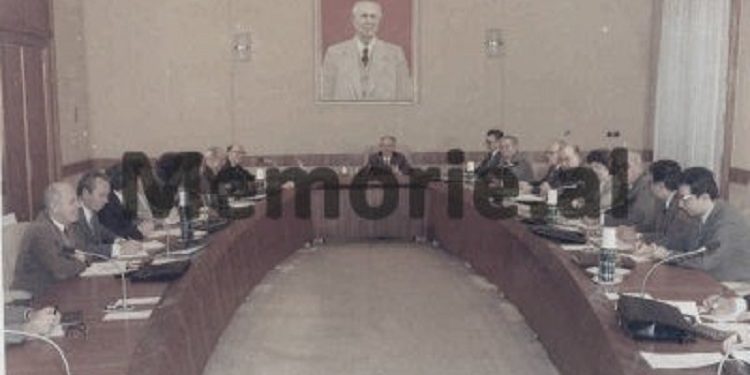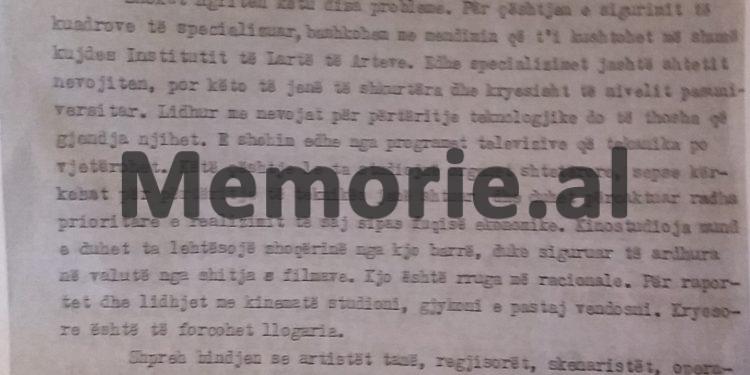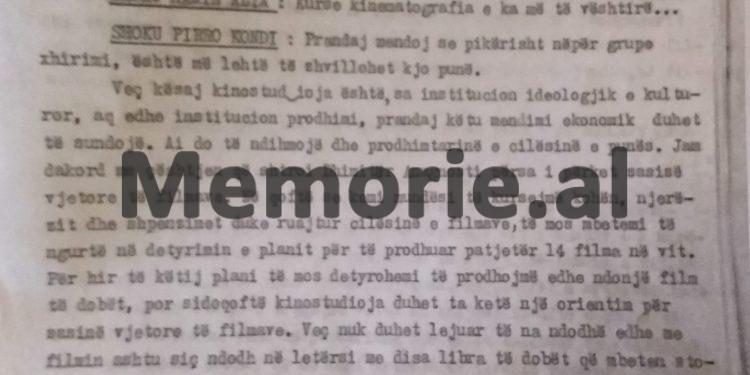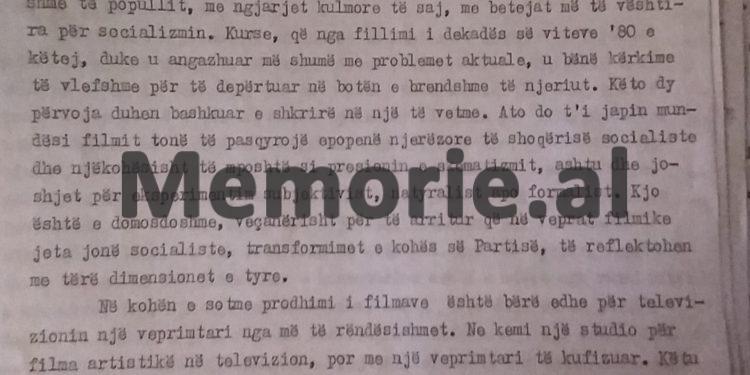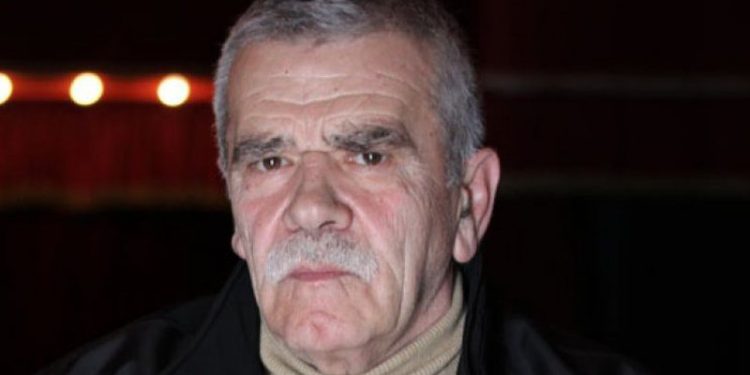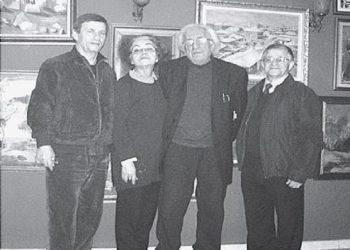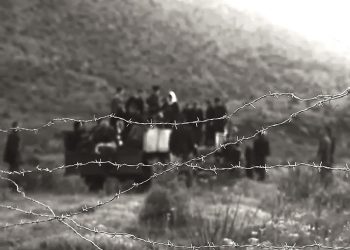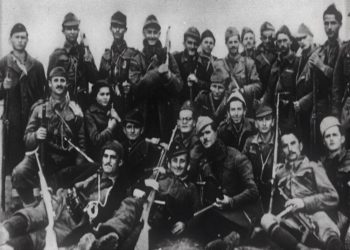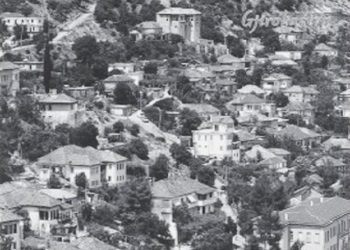Dashnor Kaloçi
Part seven
Memorie.al publishes some archival documents extracted from the Central State Archive in Tirana (fund of the former Central Committee of the ALP), belonging to 1990, where there is a record of the meeting of the secretariat of the Central Committee of the ALP which, as the main item on the agenda, had “on some issues of today’s cinematic creativity” and in that meeting which was chaired by the First Secretary of the Central Committee of the ALP and the Chairman of the Presidium of the People’s Assembly of The Socialist People’s Republic of Albania, Ramiz Alia, in addition to the secretaries of the Central Committee such as: Foto Çami, Hekuran Isai and Lenka Çuko, also attended some of the highest officials of the party and state leadership of that time, such as: Spiro Dede, Abdyl Backa , Ali Vukatana, Sotir Koçollari, Alfred Uçi, Dritëro Agolli, Lisen Bashkurti, Skënder Gjinushi, Neritan Babamusta, Dhimitër Shandro, Marash Hajati etc. The full minutes of the meeting with conversations and discussions between Ramiz Alia and the senior party and state leadership of that time, with the main leaders from the creative sector of Kinostudio “Shqipëria e Re”, such as: Teodor Laço, Dhimitër Anagnosti and Nexhati Tafa, who dwelled for a long time on the problems of Albanian cinematography.
“Both ways seem to be rational and useful. Complete studies are also necessary, e.g. students of the directing branch at the Higher Institute of Arts, can study for directing after finishing 3-4 years of school. In general, and in other parts of the world, directors prepare after graduating from high school. Directing studies are a second school for them. In many cases, those who prepare for directing do not go to the faculties of drama or directing, but to other faculties, especially the faculties of literature. We have not practiced this until today, but with those of the director, because at the present time usually the director of the film is also the author or co-author of the screenplay. This would be one way of full professional preparation. The second way is to prepare the staff we have with postgraduate courses with a short period of 1 year for directing. For example, this year we successfully closed a postgraduate course with 4 students of directing, who made two good films. To prepare for the first road we sent a student to France who will study 4 years of directing. However, he is the only one and, in my opinion, seeing the demands that Kinostudio has today, it is very little …!”
This was stated, among other things, in his speech at one of the meetings of the secretariat of the Central Committee of the ALP in 1990, Teodor Laço, then head of the script editorial office at the Kinostudio “Shqipëria e Re”, a meeting on “Some issues of today’s cinematographic creativity ”, which was chaired by the First Secretary of the Central Committee of the ALP and the Chairman of the Presidium of the People’s Assembly of the People’s Socialist Republic of Albania, Ramiz Alia, where in addition to other secretaries of the Central Committee, as Photo Çami, Lenka Çuko and Hekuran Isai, were also present in most of the senior party and state leadership of that time that had direct or indirect connections with art and culture. For more than what was discussed in that meeting where besides Teodor Laços, from Kinostudio “Shqipëria e Re”, participated also the director Dhimitër Anagnosti and the screenwriter, Nexhati Tafa, the document in question introduces us to the minutes of that meeting, which Memorie .al publishes it in full and for the first time in some issues of the dossier section.
Followed by the last number
Minutes of the meeting of the Secretariat of the Central Committee of the ALP, with the staff of the creative sector of Kinostudio “Shqipëria e Re”
COMRADE ALFRED UÇI: Our theater has staged this novel by Ismail.
COMRADE RAMIZ ALIA: And cinematography is more difficult…
COMRADE PIRRO KONDI: Therefore, I think that it is easier to do this work in shooting groups. In addition, Kinostudio is both an ideological and cultural institution, as well as a production institution, therefore economic thought should rule here. It will help produce quality work. I agree with the question raised by Dhimitër Anagnosti regarding the annual amount of films. If we can afford to save time, people, and money while maintaining movie quality, we should not be stuck in forcing the plan to produce 14 movies a year. For the sake of this plan, do not be forced to produce any poor films.
However, Kinostudio should have an orientation for the annual amount of films. It should also not be allowed to happen to us with film, as it does in literature, with some poor books remaining stocks in bookstores. There should be some kind of control over both the quantity and quality of the films. When we see that it is a weak scenario, it is better to remove it and not become formalists just to save the number. By better organizing the work and establishing the economic principle, the tendency for equalization of values will be fought. Will be judged more objectively for the best films and artists. In this regard, we must insist more than in many cases on the reward they receive, the talented and conscientious artist, like Robert Ndrenika, can hardly be distinguished from the one who is not like that and does not work enough.
The problem of the material base has been raised by the friends of Kinostudios for several years. And they do have concerns. At Radio-Television, with which they compare the material base, we have made and will have to spend some more. Although Television in its current state, has presented very large demands. We know that the equipment of the film studio is very old and has almost surpassed the technology capabilities that belong to it. I think something needs to be done there, but I agree with Dritëroi, that we cannot afford it all at once. The material gives an opinion on the shortening of the documentary film, which I agree with. We can save on documentary, and develop more feature film, by spending more on color film. It is anachronistic to continue with black and white movies.
COMRADE RAMIZ ALIA: Is there another friend to discuss?! (No) Well, then I’m saying, some thoughts. Our film studio has established itself within a relatively short time. Albanian film has become loved and welcomed by the people, especially by the younger generations. In his fund, there are 150 works. Our directors and artists have shown and are showing themselves to be very talented. It is appropriate to repeat what Comrade Enver Hoxha said two decades ago, that we have world-class artists who are able to cope with the most difficult roles.
It is a fact that in relation to the number of populations, as stated in the report, Albania occupies a good place among the producers of feature films. But we need to make a clarification. Such averages express the side of quantity, and not the degree of fulfillment of the spiritual requirements that people have. In the four decades of our Kinostudios, I think there are two outstanding experiences to be mentioned. In the ‘70s the great epic theme was successfully dealt with, which had to do with the glorious history of the people, with its culminating events, with the most difficult battles for socialism. And from the beginning of the ’80s onwards, engaging more with current problems, research was done to penetrate into the inner world of man.
These two experiences must be merged into one. They will enable our film to reflect the human epic of socialist realism, and to overcome the pressure of schematism. This is necessary for the film works, our socialist life and the great transformations, to be reflected in all their dimensions. Nowadays, the production of films has become a necessary activity for Television. We have a studio for feature films on Television, but with limited activity. There is room for positive change here. The technique available to Television should be used more profitably to produce feature films.
Kinostudio, Theater, and Television, through collaboration, can help each other with the advantages they have. Conceptual changes need to be made for the documentary. For this, it is necessary to give up polishing, staging, and posing. The documentary needs authentic truth, without extension, without fabrications. Otherwise he has no value in telling the story. Everyone likes those little sequences stored in the archive for first year stocks. Nobody makes a bad impression on the difficulties of work. But today, are there difficulties in our productive and social activity?! Of course, there is. But he rarely finds a movie that shows how to work in the Bulqiza mine. Some events when you watch them in the documentary, lose their real weight. Difficulties and obstacles really exist. If you do not reflect them, the heroism of the people fades. The documentary does not want embellishments or blackouts, but life as it is.
The recent decisions of the Plenum of K.Q. of the ALP, should be reflected in the film studio “Shqipëria e Re”, and in economic terms. Today, the donation for difference is applied to this institution but also to others. So, they completely spend the income they create, and regardless of the plans, they are subsidized by the state for all the other expenses that result. In 1988, it was planned that cinemas without investments would receive a donation of 800 thousand ALL. But they received, 1.5 million, that they did not realize the income. On the other hand, the economic and financial activity of Kinostudios is separated from the results of cinemas. So economically, she will not know where her films end up, how much they are seen, and what income they make. This also happens with publishing houses.
This way of economic management is not rational. There are more useful opportunities for managing the income of artistic institutions, but the government needs to think seriously about this. It is known how it is currently, the state of cinemas. Their halls have been left unattended and are deteriorating day by day, at a time when cinema is facing the challenge of Television. The need for investment is evident. The fairest solution would be to cover these investments, mainly by exceeding the revenues from cinemas, by radically improving their work. The principle of “taking what they give us and providing what they ask for” weighs heavily on the popular economy. Cinemas, and other cultural institutions, need to be given the opportunity to win with the necessary mechanisms in order to afford the maintenance themselves.
Friends here, raised some problems. On the issue of providing specialized staff, I agree with the opinion that more attention should be paid to the Higher Institute of Arts. Overseas specializations are also needed, but to be short and postgraduate level. Regarding the needs for technological renewal, I can say that this situation is known. We also see from television programs that the technique is becoming obsolete. Let the state bodies study this issue, because the requirements for repetition of the technique have increased, and the priority order of its realization according to the economic power must be determined.
The film studio may need to relieve society of this burden by providing money from the sale of films. This is the most rational way. For cinema reports and connections, study, judge, and then decide. The key is to strengthen the account. I am convinced that all artists, directors, screenwriters, and cameramen will respond best to the tasks before them. Thank you very much for all the thoughts you brought to this meeting. We now turn to the discussion of the second issue. /Memorie.al





